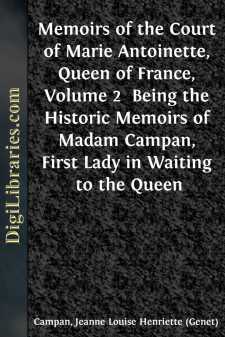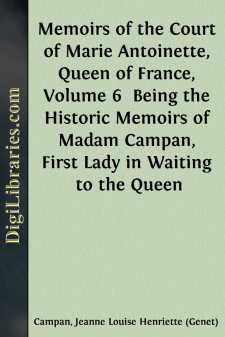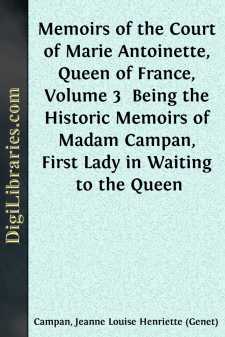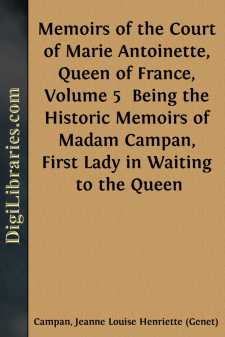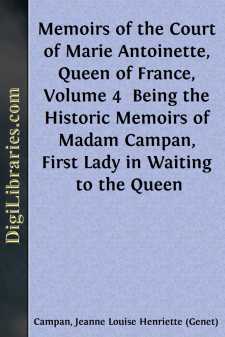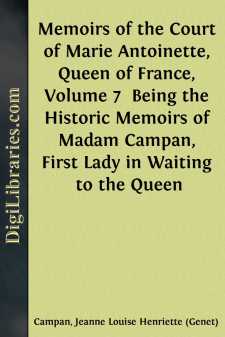History
- Africa 30
- Americas (North Central South West Indies) 50
- Ancient 68
- Asia 58
- Australia & New Zealand 8
- Canada 41
- Caribbean & West Indies 1
- Civilization 20
- Eastern Europe 12
- Europe 310
- Expeditions & Discoveries 60
- General 77
- Historical Geography 1
- Jewish 9
- Latin America 3
- Medieval 8
- Middle East 13
- Military 248
- Revolutionary 8
- Study & Teaching 5
- United States 353
- Western Europe 56
- World 13
History Books
Sort by:
President de Nesmond—upright, clear-headed magistrate as he was—was of very great service to me at the Courts of Justice. He always managed to oblige me and look after my interests and my rights in any legal dispute of mine, or when I had reason to fear annoyance on the part of my husband. I will here relate the grief that his young wife caused him, and it will be seen that, by the side of this...
more...
CHAPTER I. I was fifteen years of age when I was appointed reader to Mesdames. I will begin by describing the Court at that period. Maria Leczinska was just dead; the death of the Dauphin had preceded hers by three years; the Jesuits were suppressed, and piety was to be found at Court only in the apartments of Mesdames. The Duc de Choiseuil ruled. Etiquette still existed at Court with all the forms it...
more...
In the beginning of the spring of 1791, the King, tired of remaining at the Tuileries, wished to return to St. Cloud. His whole household had already gone, and his dinner was prepared there. He got into his carriage at one; the guard mutinied, shut the gates, and declared they would not let him pass. This event certainly proceeded from some suspicion of a plan to escape. Two persons who drew near the...
more...
During the first few months of his reign Louis XVI. dwelt at La Muette, Marly, and Compiegne. When settled at Versailles he occupied himself with a general examination of his grandfather's papers. He had promised the Queen to communicate to her all that he might discover relative to the history of the man with the iron mask, who, he thought, had become so inexhaustible a source of conjecture only...
more...
CHAPTER I. The ever-memorable oath of the States General, taken at the Tennis Court of Versailles, was followed by the royal sitting of the 23d of June. In this seance the King declared that the Orders must vote separately, and threatened, if further obstacles were met with, to himself act for the good of the people. The Queen looked on M. Necker's not accompanying the King as treachery or...
more...
About the close of the last century several of the Northern sovereigns took a fancy for travelling. Christian III., King of Denmark, visited the Court of France in 1763, during the reign of Louis XV. We have seen the King of Sweden and Joseph II. at Versailles. The Grand Duke of Russia (afterwards Paul I.), son of Catherine II., and the Princess of Wurtemberg, his wife, likewise resolved to visit...
more...
The Queen having been robbed of her purse as she was passing from the Tuileries to the Feuillans, requested my sister to lend her twenty-five louis. [On being interrogated the Queen declared that these five and twenty louis had been lent to her by my sister; this formed a pretence for arresting her and me, and led to her death.—MADAME CAMPAN.] I spent part of the day at the Feuillans, and her Majesty...
more...
by:
Lewis Goldsmith
PARIS, August, 1805. MY LORD:—Bonaparte has been as profuse in his disposal of the Imperial diadem of Germany, as in his promises of the papal tiara of Rome. The Houses of Austria and Brandenburgh, the Electors of Bavaria and Baden, have by turns been cajoled into a belief of his exclusive support towards obtaining it at the first vacancy. Those, however, who have paid attention to his machinations,...
more...
by:
Lewis Goldsmith
PARIS, August, 1805. MY LORD:—No Sovereigns have, since the Revolution, displayed more grandeur of soul, and evinced more firmness of character, than the present King and Queen of Naples. Encompassed by a revolutionary volcano more dangerous than the physical one, though disturbed at home and defeated abroad, they have neither been disgraced nor dishonoured. They have, indeed, with all other Italian...
more...
by:
Lewis Goldsmith
PARIS, November 10th, 1805. MY LORD,—The Letters I have written to you were intended for the private entertainment of a liberal friend, and not for the general perusal of a severe public. Had I imagined that their contents would have penetrated beyond your closet or the circle of your intimate acquaintance, several of the narratives would have been extended, while others would have been compressed;...
more...



